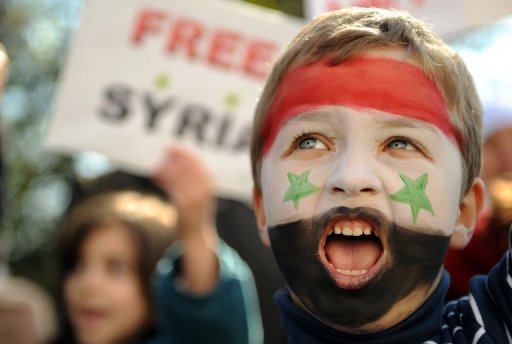by Adam J. Deutsch
Over the last eight months, nonviolent protests have erupted across Syria; while the central regions including Homs and Hama have been particular hotbeds of revolution for organized youth, protesters have also gathered in the suburbs of Damascus, the southern province of Daraa, and the northern provinces of Aleppo, Idib, and Hassakeh.
But the nonviolence of these protests has led to tragedy. The United Nations recently declared that over 3,500 Syrians have been murdered due to their participation in the protests or their affiliation with organizers. Though President Bashar al-Assad has explicitly denounced the protesters and has authorized their deaths, he is not the sole bearer of moral responsibility; it is critical to remember that nearly every day for the last 8 months, protesters have been shelled by Syrian soldiers and helicopter pilots. As for another stunning display of perverse politics, the thousands of Syrian supporters of the regime gathered in Aleppo on October 19th to argue for the standing legitimacy of Mr. Assad’s presidency. According to Nada Bakri of the New York Times, religious minorities and elites with economic interests vested in the current political structure mostly filled the crowd.
International response to the undeniable atrocities has been mixed. To supplement President Barack Obama’s and Secretary of State Hillary Clinton’s denouncement of Mr. Assad and his regime in recent months, the European Union recently barred all transactions with Syria Central Bank and froze its reachable assets. Turkey has halted the sale of arms to Syria and has been hospitable to the rebel representative group — the Syrian National Council. Though an international consensus seemed to be building in condemnation of Mr. Assad’s deplorable crimes against the humanity of his own people, a U.N. resolution that sought unified sanctions on Syria failed to pass through the Security Council. Even after the United States and some European nations agreed to dramatically soften the language of the resolution, China and Russia exercised their vetoes.
China and Russia argue that the resolution would encourage the United States and its European allies to intervene militarily, given the NATO-led intervention in Libya. Additionally, China and Russia justly feel it important to consider any intervention in Syria against the backdrop of its close relations with Iran and Lebanon’s Hezbollah.

And so as world leaders debate the situation in Syria and whether it may or may not meet their often conflicting criteria for intervention, it should be known that we are watching a divided Syria on the verge of civil war. The Free Syrian Army — a military organization comprised by 10,000 Syrian defectors and protesters — has now formed as an arm of the Syrian National Council; skirmishes have broken out, and the death tolls are mounting daily. The question of international intervention and pressure is complex enough as it is, but as the revolt increasingly elicits violence, these questions rapidly complicate.
But there is an organization that should be dealing with Syria much more intimately then, say, the United States or its NATO allies; namely, the Arab League. Sure enough, after signing an agreement with the Arab League to end the deadly crackdowns, Mr. Assad has continued to pursue violent action against protesters. As a result, the Arab League voted almost unanimously on November 12th to suspend Syria’s membership and to further consider economic sanctions, with Yemen and Lebanon voting nay, and Iraq abstaining. Moreover, this past Sunday, the Arab League approved sanctions on Syria in an unprecedented move against a fellow Arab nation. While I commend the suspension and sanctions, it is undeniable that the Arab League shares in the responsibility for the deaths of 3,500 Syrians — Mr. Assad is nothing short of a tyrant, and the weak and delayed action of the Arab League thus far demonstrates widespread corruption in the region.
The Arab League has begun to redress its moral failure far too late. As a testament to the broader implications and consequences of this apparent moral failure, many members of the Arab League are dealing with their own revolutions or reforms; perhaps these members are focused on piecing back together their shattered — or soon-to-be-shattered — houses before they throw stones.
There is one state in the region that has no excuse, however, for inaction because she repeatedly makes claims to stability, to democracy, to broad-based economic opportunity. As Mr. Assad murders thousands, Mr. Netanyahu and the Jewish State of Israel stand idly by. It is ironic that one of Israel’s greatest moral blemishes will not come about due to anything involving settlements in the West Bank or bombings in Gaza; it will come about because the Jewish state has turned its eye from the firing squads just next door.


Deutsch may simply be the best.
http://www.nytimes.com/2011/12/09/world/middleeast/factional-splits-hinder-drive-to-topple-syrias-assad.html?ref=middleeast
Update article from the NYTimes — Question for discussion: should Syrian rebels go on offense? Or should they stay on defense, hoping to maintain the moral high ground?